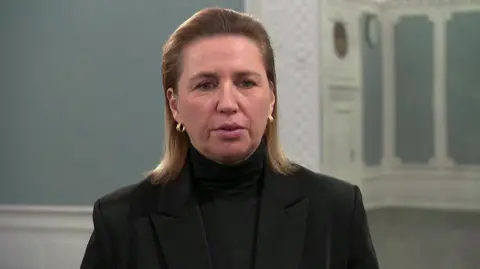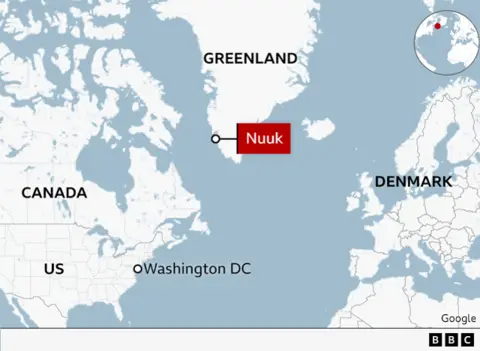
 Reuters
ReutersThe dreary January weather in Copenhagen fits the mood among Danish politicians and business leaders.
“We take this situation very seriously,” Foreign Minister Lars Løkke Rasmussen said, commenting on Donald Trump’s threats to seize Greenland and punish Denmark with high tariffs if it stands in the way.
But he added that the government had “absolutely no ambition to escalate some of the war of words.”
Prime Minister Mette Frederiksen downplayed Trump's suggestion that the United States might use military force to seize Greenland. “I don't have the imagination to imagine it would ever come to this,” she told Danish television.
Lars Sandahl Sørensen, CEO of the Danish industry, said there was “every reason to remain calm… No one has any interest in a trade war.”
But behind the scenes, high-level meetings have been hastily organized in Copenhagen all week, reflecting the shock caused by Trump's comments.
Greenland's Prime Minister Mute Egede arrived to meet the Prime Minister and King Frederick X on Wednesday.
On Thursday night, party leaders from across the political spectrum gathered for an extraordinary meeting on the crisis with Mette Frederiksen in the Danish parliament.
In the face of what many in Denmark call Trump's “provocation,” Frederiksen has broadly attempted to strike a conciliatory tone, repeatedly referring to the United States as Denmark's “closest partner.”
 Agence France-Presse
Agence France-PresseShe added that it was “natural” for the United States to be concerned with the Arctic and Greenland.
However, she has also said that any decision about Greenland's future should rest with its people alone: ”Greenland belongs to the Greenlanders… and it is the Greenlanders themselves who must determine their own future.”
Her cautious approach is twofold.
On the one hand, Frederiksen is keen to avoid escalating the situation. She's been burned before, in 2019, when Trump canceled a trip to Denmark after she said his proposal to buy Greenland was “ridiculous.”
Veteran political journalist Eric Holstein told the BBC: “At that time he only had one more year in office, and then things went back to normal.” “But maybe this is the new normal.”
But Frederiksen's comments also indicate Denmark's determination not to interfere in the internal affairs of Greenland – an autonomous region with its own parliament and whose population is increasingly leaning toward independence.
Opposition MP Rasmus Jarlov said: “She should have been more clear in rejecting the idea.”
“This level of disrespect on the part of the next US president towards very loyal allies and friends is a record,” he told the BBC, although he acknowledged that Trump's strength “surprised everyone.”
The Conservative MP believes that Frederiksen's insistence that “only Greenland… can decide and determine Greenland's future” has put too much pressure on the islanders. He added, “It was wise and intelligent to stand behind Greenland and clearly declare that Denmark does not want (the United States to seize it).”
 Agence France-Presse
Agence France-PresseThe Greenland issue is a sensitive one for Denmark, whose prime minister only recently formally apologized for leading a social experiment in the 1950s that saw Inuit children taken from their families to be re-educated as “model Danes.”
Last week, Greenland's leader said the territory must free itself from the “shackles of colonialism.”
In doing so, he tapped into growing nationalist sentiment, fueled by interest among younger generations in Greenland in indigenous culture and Inuit history.
Most commentators now expect a successful independence referendum in the near future. While many may see it as a victory, it could also lead to a new set of problems, as 60% of Greenland's economy depends on Denmark.
An independent Greenland “will need to make choices,” Carsten Hong said. The Social Democrat MP now fears that his preferred option of a new Commonwealth-style deal “based on equality and democracy” is unlikely to materialise.

Sitting in his parliamentary office decorated with poems and drawings depicting scenes from Inuit life, Hong said Greenland would need to decide “how much it values independence.” She could cut ties with Denmark and head to the United States, “but if you value independence, that doesn't make sense,” Hong said.
Opposition MP Jarlov says that although there is no point in forcing Greenland to be part of Denmark, it is “very close to becoming a truly independent country”.
Its capital, Nuuk, is self-governing, but depends on Copenhagen for currency management, foreign relations and defense – as well as large subsidies.
“Greenland today has more independence than Denmark from the European Union,” Jarloff added. “So I hope they think things through.”
As Mette Frederiksen has the difficult task of responding firmly while not offending Greenland or the United States, the strongest response to Trump's comments so far has come from outside Denmark.
German Chancellor Olaf Scholz warned that the principle of inviolability of borders “applies to every state… regardless of whether it is a very small state or a very powerful one,” while French Foreign Minister Jean-Noel Barrot said the EU would not allow this. Other countries are “attacking their sovereign borders.”
Their comments revealed deep anxiety within the EU about how to handle the incoming Trump presidency. Representative Carsten Hong said: “It is not only a great danger for Greenland and Denmark, but it is also a danger for the whole world and for Europe as a whole.”
“Imagine a world – which we may face in a few weeks – where there are no international agreements. This would shake everything up, and Denmark would be only a small part of it.”
Likewise, the Danish trade sector was plunged into deep tension after Trump said he would “impose tariffs on Denmark at a very high level” if it refused to cede Greenland to the United States.
A study of Danish industry for 2024 showed that Denmark's GDP would fall by three points if the US imposed 10% tariffs on imports from the EU to the US as part of a global trade war.
Isolating Danish products from the flow of EU goods would be almost impossible for the United States, and would almost certainly lead to retaliatory measures by the EU. But trade industry professionals take little risk, and in Denmark, as elsewhere on the continent, vast amounts of resources are being spent internally to plan the likely outcomes of Donald Trump's second term in the White House.
As his inauguration approaches, the Danes are preparing as best they can to weather the storm. There is cautious hope that the soon-to-be president-elect can shift his focus toward grievances toward other EU partners, and that the Greenland issue could be temporarily shelved.
But the discomfort caused by Trump's refusal to rule out military intervention to seize Greenland remains.
Carsten Hong said that Denmark would have suffered whatever decision the United States would have taken.
“They just need to send a small warship to travel up the coast of Greenland and send a polite message to Denmark,” he partly joked.
“The last sentence would be: Well, Denmark, what are you going to do about it?
“This is the new reality regarding Trump.”









